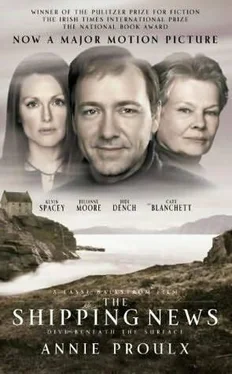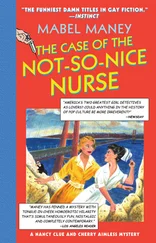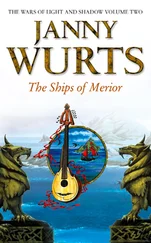Quoyle ran his finger over the meticulous joinery and glassy finish. And said he thought they were fine.
The little house was full of colors, as though inside Wavey’s dry skin an appreciation for riot seethed. Purple chairs, knotted rugs of scarlet and blue, illustrated cupboards and stripes margining the doors. So that, standing in the color she was like an erasing of the human, female form.
Sunshine liked a cabinet with glass doors. Behind the glass a white tureen, a row of plates with swimming fish around the rims, four green wineglasses. On each of the lower doors Wavey had painted a scene; her own house with its painted fence; her father’s yard of wooden figures. Sunshine opened the father’s door. It made a wheezing squeak. She had to laugh.
28 The Skater’s Chain Grip
To rescue someone who has fallen through the ice, the fingers
of the rescuer’s hand and the victim’s hand are bent together in
an opposing grip.
“Fingernails should first be close-pared”
THE ASHLEY BOOK OF KNOTS

THE AUNT out for a look around. She’d wanted a breath of air, to get away from Quoyle and his children in the house. To get away from Sunshine’s humming and clattering shoes and piercing questions. The tape from Nutbeem that Bunny played endlessly, running down the batteries. The last days of October, a rattle of guns along the coast as the flights of turr came down ahead of the growing ice. Turbot massed off the shelf to the east. Spent salmon lay deep in river pools under the crusting ice or drifted to the sea.
She came upon a small pond. Remembered it, this water oval surrounded by hurts and laurel, women and children moving across the autumn marsh, bakeapples glowing like honeydrops in the slanting light. Leaky boots, birds fluttering up when the berry pickers drew near. Her mother always loved the marshes despite the nippers. Find a bit of high ground, sleep for a little while under the flying clouds. “Oh,” she said, “I could sleep away the rest of my life.” How much she had slept through, unknowing! And died in a Brooklyn hospital bed of pneumonia believing she was on the barrens in the northern sun.
The aunt let herself remember an October, the pond frozen, ice as colorless as a sadiron’s plate, the clouds in thin rolls like grey pencils in a box. Crowberries encased in ice skins. The wind collapsed. Deepest silence, the vapor of her breath floated from her mouth. Distant soughing of waves. No dead grass trembled, no gull or tun flew. A pearl grey landscape. She was eleven or twelve. Blue knit stockings, her mother’s made-over dress. A boiled wool coat, English, tight under the arms, some castoff funneled through the Pentecostal charity. She had a huge pair of man’s hockey skates, drew them on over her shoes, laced them tightly. A lace broke. She made a granny knot, poked the metal tip through the eyelet, tied bowknots.
The slanted white marks of the first strokes, then curls and loops like unspooling thread. In the windless twilight she hurtled through the cold. Sound of breathing, skate-risp. Alone on the perfect ice in the red afternoon, the clouds like branches, like a thicket of wavering bleeding branches. Alone. And a pork bun in her pocket. Looked up and saw he was there.
He came onto the ice, unbuttoning his pants, sliding gingerly on the soles of his fishing boots. And although there was no place to go but around and around, although she knew he would get her later if not now, she skated away, evaded his lunging for a long time. Maybe ten minutes. A long time.
She stood now and looked at the pond. Small, uninteresting. No reason to go down to it. The sky was not red but almost black in the southwest. Storms on the way. Soon enough there would be frost on the glass, frost-fur on the sills, the edging of frost that gathered on the quilt where the breath condensed, the timbers of the house contracting in the arctic nights with explosive creakings and snappings. As it was, once. Then, the slide of feet, hot breath on her face. And outside the ravenous wind in the cables, slamming down the chimney and sending rims of smoke up around the stove lids. The raw misery of February. And March, April. Snow until late May. Shuddered.
Well, that life had hardened her, she had made her own way along the rough coasts, had patched and mended her sails, replaced chafed gear with strong, fit stuff. She had worked her way off the rocks and shoals. Had managed. Still managed.
The air tingled. Distant ice was moving down. Snow crystals like shreds of clear plastic formed in cloudless sky, came out of nowhere. She trudged back to the house, the cold in her nostrils like a burned smell. Must listen to the weather forecast. That long drive around. They couldn’t put things off much longer.
Inside she hung up her coat, draped her hat over the shoulder, the lined black gloves in the right pocket. Neatly, the fingers inside, the cuffs hanging limp.
The nephew was reading to them. Might as well start some supper. Something simple. Pancakes. And, pouring flour into the bowl, thought about the coming snow. They had to talk about it. The first storm could close the road. He wouldn’t know.
The wind came skirling down over the tuckamore, moaned through the house cables.
“Supper!” called the aunt. How loud her voice was in the half-furnished room.
“What I wouldn’t give right now,” she said suddenly to Quoyle, forking a pancake onto his cold plate, “to be eating a nice dinner at a good restaurant and going to see a good movie. What I wouldn’t give to go out and get on a heated bus tomorrow morning instead of driving that truck all around the bay. I tell you frankly, the winter begins to scare me.”
As if it had been waiting for the season to be pronounced the snow started, flicking a few grains against the windows.
“You see?” said the aunt as if supported by an ally in an argument.
Quoyle chewed his mouthful of pancake, swallowed tea. He’d thought about it.
“I talked to the bulldozer guy, Dennis’s friend. He’ll plow the road for a price. If the snow is more than three inches. Your truck can manage that much.”
“Twenty-eight miles of plowing! What price might that be?”
“A hundred a pop. Barely pay for the gas. Figured on what the storm frequency is, he estimates he’d have to come out a minimum of twice a week. In five months that’s forty plowings. That’s four thousand dollars. Another possibility is Dennis. He said he could ferry us back and forth with his boat until it iced up too much. If we could pay for the gas and his time at, say, ten dollars an hour.”
“Well, that’s a better bargain,” said the aunt.
“I don’t think so. Figure he has to spend two hours a day-it’s twenty minutes across in smooth water. That’s the same as the bulldozer, a hundred a week. And by January the bay will be iced in. I don’t want to risk the girls on a snowmobile going back and forth across the bay. Dennis says there are weak spots. It’s dangerous. Every winter somebody goes through and drowns. You have to know the route. Come to that, I don’t like this long drive for them every day, either.”
“You have been thinking of all the angles,” said the aunt. Dryly. She was used to being the one who figured things out.
He did not say that the day before the capsize he had walked through the bare rooms of the house and guessed her furniture was not coming this year.
“Then,” he said, cutting Sunshine’s pancake with the edge of his fork to quell her screaking knife, “we could shift across the bay for the winter. Consider this place a summer camp. Nutbeem is leaving in a week or two. His trailer. There’s not room for all four of us, but the girls and I could manage. If you could find a room. Or something. Wouldn’t Mrs. Bangs know of something?”
Читать дальше












